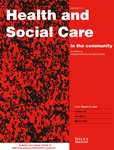Love stories: understanding the caring journeys of aged Greek-Australian carers
Abstract
This article documents the findings of a short-term longitudinal study that explored the caring journeys of aged Greek carers providing in-home care for their spouse. Through a deeper understanding of carers’ decisions and decision-making and insights from service providers and community leaders, we aimed to inform policy makers, service managers and providers about how to develop and promote culturally appropriate support services, and negotiate them with carers and care recipients in a timely way. Initially, we conducted three focus groups and one follow-up forum with service providers and Greek community leaders. Then, over a 6-month period, we conducted two in-home interviews and two telephone interviews with 12 older Greek carers. We sought to understand factors influencing carers’ decision-making regarding service uptake, and we provided information about services as required. Through our thematic analysis, we found that most carers wanted to remain as independent as possible and to avoid forced separation from the one they loved, through institutionalisation. They placed great value on their caring role which, while a struggle at times, gave them a sense of meaning, purpose and belonging. We also found that carers had great resourcefulness, strength and competence. They were all in long-term relationships, had negotiated coming to a foreign country and establishing themselves and were now in the process of negotiating old age and increasing frailty while at the same time providing care and support to family and friends. Our findings suggest that services need to be communicated in ways which support what carers value, not on outdated assumptions about cultural groups, otherwise providers will perpetuate exclusion. We propose an outreach in-home service model with an emphasis on ageing well and staying at home. This model of service provision is a model of care which emphasises relationships and community, and seeks to build social and cultural capital.




